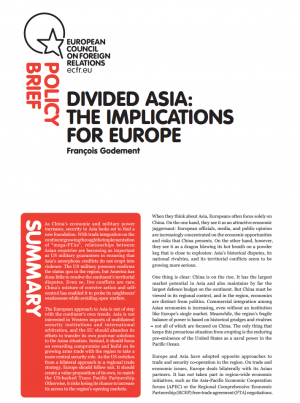Divided Asia: The implications for Europe
Why Europe needs a new Asia strategy
This week’s EU-China summit – the first between the EU and the new Chinese leadership – could be the beginning of a new, ambitious relationship between the EU and China. But it’s going to be an uphill struggle. China has stalled on a Partnership and Cooperation Agreement and it remains to be seen whether the proposed investment deal is a step forward. As usual, the Chinese leadership will drive a hard bargain, so a new EU-China deal will be hard to reach.
Earlier this week the EU-Japan summit has delivered an unprecedentedly detailed joint statement – both in terms of trade and security: the EU will support diplomatic initiatives to defuse tensions in maritime East Asia, and the summit also marks a new step towards the conclusion of a Free Trade Agreement. But these talks are under the shadow of Japan's other main trade negotiation – the US-backed Trans Pacific Partnership.
These events illustrate the need for a bolder European policy towards Asia. In a new ECFR policy brief, “Divided Asia: the implications for Europe”, Francois Godement argues that Europe should develop a new Asia strategy that is honest, ambitious – and above all, regional. This should include the following:
- Development of a Europe-Asia-Partnership (EAP): the EU’s focus on bilateral trade deals is no longer enough. Europe needs to create a regional trade and investment proposal to match the US-backed Trans Pacific Partnership while offering China the opportunity to join. Otherwise, it risks falling behind in gaining more access to the region’s expanding markets.
- A focus on regional energy security: Asia needs new energy resources for its economic success. Europe should prioritise the enhancement of energy security through common initiatives, from the limitation of the use of sanctions and boycotts to the creation of an agreement on rights of navigation (as opposed to freedom of navigation) and joint sharing of resources and surveillance of exclusive economic zones.
- A common strategy for Europe’s arms sales to Asia: Arms sales are flourishing thanks to a regional arms race, and Europe is one of the main players. Europe is a much more important security actor in Asia than it thinks it is. But the lack of a common European strategy continues to dilute Europe’s influence in the region.
“The European approach to Asia is out of step with the continent’s own trends. Asia is not interested in Western imports of multilateral security institutions and international arbitration, and the EU should abandon its efforts to transfer its own post-war solutions to the Asian situation. Instead, it should focus on rewarding compromise and build on its growing arms trade with the region to take a more central security role.” – Francois Godement
The European Council on Foreign Relations does not take collective positions. ECFR publications only represent the views of their individual authors.



